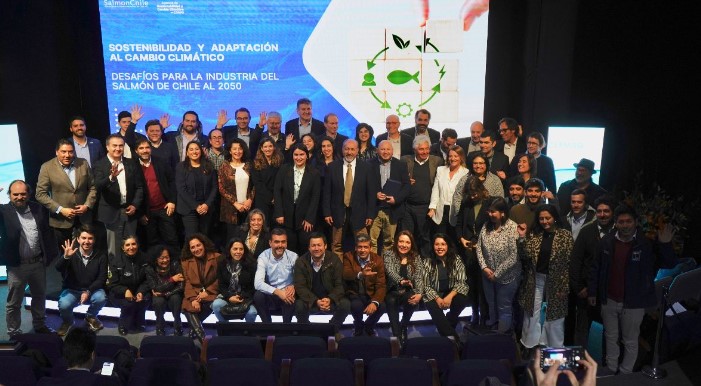
The environmental achievements achieved by production and supplier companies in the sector were highlighted within the framework of the seminar “Sustainability and Adaptation to Climate Change.”
Advancing in the circular economy and standardizing the measurement of the carbon footprint were among the main milestones achieved by 21 salmon farming companies -both producers and suppliers-, which in 2021 began a process to have more sustainable operational practices, based on the Agreement Clean Production (APL) signed between the Sustainability and Change Agency and SalmonChile. This culminated today with the successful implementation of 42 actions, which begins the certification process.
The ceremony was held within the framework of the seminar “Sustainability and Adaptation to Climate Change: Challenges for the Chilean Salmon Industry to 2050”, organized by SalmonChile, the Sustainability and Climate Change Agency and the Salmon Technological Institute (Intesal), with the participation of CORFO, with the presentation of its executive vice president, José Miguel Benavente.
The companies that complied with the committed measures were Akva Group, Australis, Fiordo Austral, Blumar, Cermaq, Bioled, Cooke Chile, Marine Farm, Landes, Garware, Gripship, Yadrán, Salmones Austral, Salmofood, Pharmaq, Multi-X, Camanchaca, Skretting, Ventisqueros, Veterquimica and Zerocorp.
In this context, the Executive Director of Corfo’s Sustainability and Climate Change Agency, Ximena Ruz, noted during her speech that “the objective of this agreement was to advance sustainability together and contribute to the mitigation and adaptation challenges that climate change has, but involving the value chain and strengthening the link with the territories in a more concrete and measurable way.”
For his part, the president of SalmonChile, Arturo Clément, indicated that “through this agreement we have generated changes that a few years ago could have been unthinkable, along with promoting sustainability to be a fundamental piece in the functioning of the various areas of companies and SMEs that are part of Chilean salmon farming.”
Within the framework of the APL, 42 actions were considered within a period of 30 months, which concluded in March of this year. Among their achievements, it stands out that the companies were able to generate a roadmap to promote the circular economy, in addition to raising a standard so that the carbon footprint generated by each of them can be measured in a comparable way and managed.
Additionally, projects are being carried out to reduce household waste in communities through the implementation of clean points and compost bins, which also means that programs can be initiated to reduce and valorize this waste, with a positive social impact.
“What is coming in the coming months are perhaps the most important milestones, given that the certification process for the facilities begins, which is validated by the Public Services that adhered to this initiative. The impact evaluation process also begins, which seeks to gather information that accounts for the changes generated as a result of the implementation of this APL, so we are moving forward to successfully conclude this process in December,” indicated the general manager of the Institute. Salmon Technology (Intesal), Esteban Ramírez.
Source: www.diariochiloe.cl

